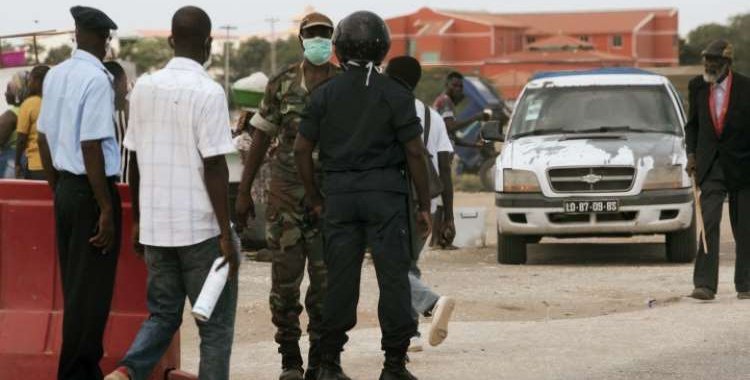There are two 'Luandas' in the capital: one, urban, where the flow of cars and people is visible; the other, suburban, where crowds remain trying to maintain their routines, despite the measures decreed by the government to contain the spread of covid-19.
If in urban Luanda, the inhabitants seem to accept the measures of quarantine and social isolation with relative serenity, in the other Luanda, that of informal commerce, of the 'musseques' (self-construction districts) and of collective taxis known as 'candongueiros', the tone is one of regret and indignation for the lack of alternatives.
This Monday, many Luandans travelled long distances on foot for lack of taxis, due to new rules requiring more distance between people, limiting collective taxis to one third of capacity.
Moisés Lucas, 21 years old, a shoeshine, waits for a taxi to work, in a queue with a few dozen people waiting for transport on Deolinda Rodrigyes Avenue, one of the busiest in town.
"We're not getting anything done, it's too hard to go to work. Fifteen days is a lot," she says.
Alberto Neto despairs for the taxi "two or three hours", to get home after visiting an aunt: "It is too much, this country is already very poor, it does not have capacity to help the people who are in this crisis," he complains.
"These people don't work, they live on 'zunga' [street vendors], they have children. The government can't do anything for these people, how is it going to prohibit them from moving around?", he challenges.
Alberto says he had no alternative but to leave home because he is the only support of his elderly aunt: "I came to give something to be able to support myself, she is already an elderly lady" who lives alone and "has no one to look after her", he justifies.
José Domingos, a security guard, has been trying to get to work for three hours: "The police are doing their job, but the population is not doing their job, I don't know what's going on", he criticizes.
Despite some crowds of people, especially at ATMs and gas outlets, the state of emergency is manifesting itself a bit everywhere, and there are those who show that they are available to comply with the rules posted at the entrance: "We're quarantined, we're not receiving anyone", and there are more orderly and spaced lines next to some bakeries and small businesses.
The police force has been reinforced with elements of the Armed Forces who are in "combat readiness until the end of the state of emergency" at 23h59 on 11 April and there are men in uniform everywhere.
Many citizens are obliged to show their identification documents and credentials at police barriers that surround several points of access to the city and impose entry and exit times.
Near the entrance of some neighborhoods, such as Bita, where a group of policemen control the passage of the vehicles, an officer with a more threatening air is hitting with the truncheon on the various cars that try to pass through there, trying to dissuade those who want to leave.
As you enter the most remote areas of the centre, and the poorest, there is a growing proximity between people.
The Market of the 30, a giant space in the municipality of Viana, is closed to the public, but there are still several salesmen who try to drain their merchandise.
Many have been forced to take their goods to sell a little further on an open-air site, even less hygienic than the market itself, crowding into a chaotic mass of people, fruits, vegetables and pieces of meat stuffed with flies.
The salesmen revolt and raise their voices. They all want to be heard and claim they've been escorted by the police.
Constança João Calombi came home to shop for food but "it's hard".
"We left the village on foot to do the shopping, we don't know what's going on, they gave us until 1pm to come and buy the food, but we're not getting it, it's a mess", she explains.
Margarida Francisco Barroso, a flour vendor, also spares no criticism: "It was to sell from 6 a.m. to 1 p.m., at least the government could make it easier".
She guaranteed that the police "wouldn't let her sell" and that they had to find alternatives, spreading themselves around "so as not to spoil" the products.
Lusa sought to find out the reasons for the closure of the 30th market, although the state of emergency had foreseen the opening of informal markets during the morning.
"Superior orders", said a responsible who asked not to be identified.
"There was disobedience. The people did not comply and decided to close," said another inspector who was on the scene.
Despite the controls at the provincial borders, the goods continue to arrive in Luanda.
Near Benfica, where the road leads to the southern provinces, a truck driver unloads his load of tomatoes, just arrived from Namibe, after two days of travel.
Josefa António came to get supplies and she too expresses dissatisfaction with the measures taken: "I work here in the market, from where my daily bread comes out. Staying at home for 15 days without being able to sell, I don't know how I'll survive".
She told us that the day before the police prevented her from passing through, although they said the market would operate between 06h00 and 13h00.
"It's very complicated, not everyone works in a company, we depend on the square," he lamented, complaining about the high cost of soap and water that does not allow everyone to protect themselves against the new coronavirus, responsible for Covid-19, which in Angola has already killed two, among seven positive cases.







